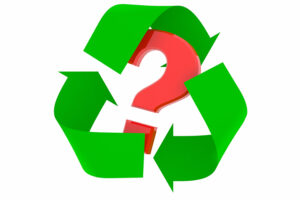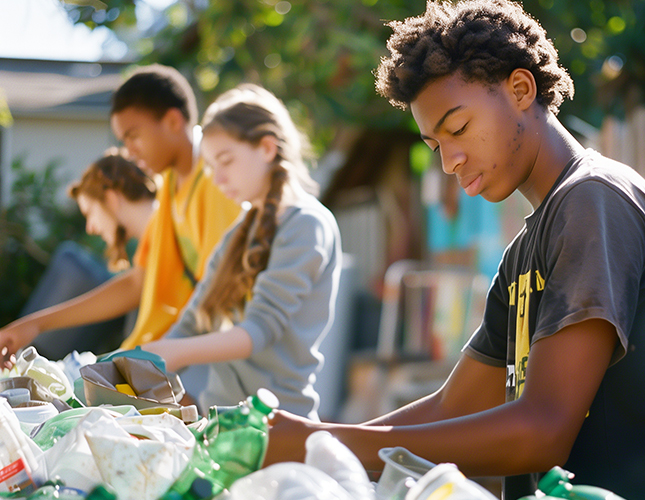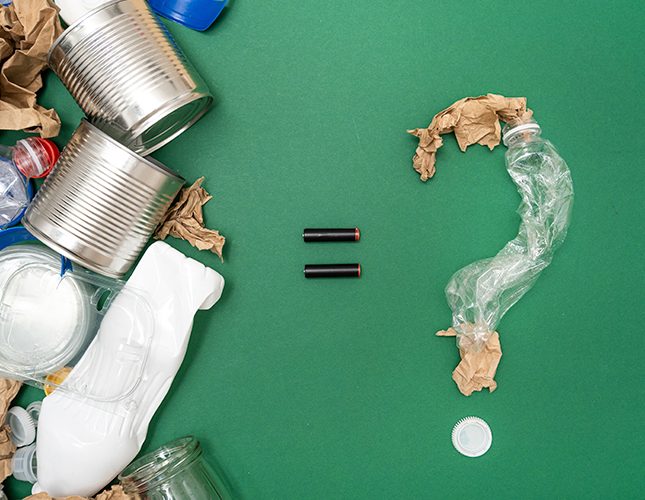Many are the myths and realities of recycling! Let’s find out the truth about 8 misconceptions.
Recycling and reducing waste are everyone’s responsibility, but some claims tend to mask reality and can be misleading.
In order to protect and preserve our environment, it is important to distinguish between the true and the false.
1. Containers must be rinsed prior to recycling
True! Containers must be rinsed before being put in the blue bin. First, to avoid the unpleasant odours to sorting centre workers, but also to avoid contaminating other containers or materials that end up in recycling.
It’s not about washing them or putting them in the dishwasher! Just rinse them to remove residues.
2. Packaging must be embedded
False! At the sorting centre, the distinction between materials is made by machines that recognize and group them. If you put a can into a box of cereal, the machines will have a harder time recognizing it. Better to put the materials in bulk in the bin.
3. Lids must be removed from containers
True! Lids are not usually made of the same material as the container. They will therefore be submitted to two different recycling processes.
4. A can, bottle or piece of plastic with a label cannot be recycled as it is a mixed material
False! Ideally, when possible, remove the label. However, if it is still in place, it will be removed during the handling process at the recycling centre.
Better recycling a bottle with a label than putting a bottle in the trash 😉

5. The Möbius loop indicates that the product or packaging is recyclable
False! This is one of the misconceptions about recycling that has a big impact on the quality of recycling. The Möbius symbol does not mean that you can put the product in your recycling bin. It all depends on what is accepted by your local recycling service.
Putting waste materials in the recycling bin simply because there is this symbol, when in fact it is not accepted by the local recycling service, can contaminate other recyclable materials and does more harm than good.
To be sure that your product can be put in the blue bin, check out the Ça va où? mobile app?, or the Recy-Québec website that will give you advice adapted to your municipality.
6. Recycler le verre consomme trop de ressource
Faux ! Oui, le verre est extrêmement gourmand en énergie et en eau. Une fois collecté et trié, le verre fait l’objet d’une refonte à 1400°C avant d’être moulé en de nouvelles bouteilles et bocaux.
Cependant, contrairement à ce que nous pourrions penser, le recyclage du verre est largement moins impactant que la fabrication de verre tout neuf.
7. If it’s plastic, glass or metal, it goes to the recycling bin
False! False! False! The materials accepted in the bin are containers, packaging or prints.
Even the definition of “container, packaging or printed material” implies nuances. Not all plastics, for example, are equal. Those with number 6, the famous blue mushroom containers, for example, are not recyclable.
As for plastic bags, they cause a lot of problems in sorting centres. They get stuck in the equipment, causing breakdowns and delays in operations. If you put them in the bin, make sure to group them all in one clear bag to make it easier to find them on the sorting line.
If in doubt, consult the mobile application Ça va où?, or the Recy-Québec website. If the doubt persists, it is better to put it in the trash.
8. Sorting is useless, as everything ends up in the landfill anyway
False! This statement is part of the myths and realities of recycling that has the hardest skin! However, the sorting centres have no interest in burying the waste because it is a source of income, whereas burying represents a cost.
According to the most recent data collected by Recyc-Québec, more than 80% of the materials received by sorting centres are sent to packers or recyclers who will give them a second life.
Ricova does not own a landfill and assumes that what is waste from one organization is the raw material from another. 96% of the material received in its sorting centres will be processed and used for upgrading.








